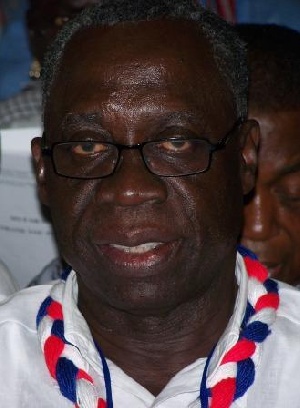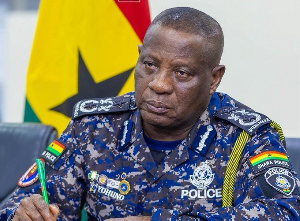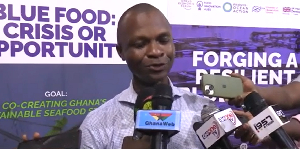For once NDC have exhibited greater sense of democratic tenets by employing multi-decisional process devoid of popular acclamation or any Swedru declaration in the choice of their presidential candidate. This is a testimony that gradually, Ghana's democratic dispensation is making greater strides. We need maturity in our political process so any political party that will exhibit qualities supporting our democracy must be given a big hug. On this note I deeply welcome Prof Mills for taking up the challenge to provide a new sense of leadership for Ghana through his party NDC.
The maturity that NDC have signalled to Ghanaians that in fact, they are ready to accept their mistakes, take up the challenge in redeeming themselves, and also show that they are 'new creatures with new ideas'. And to some of us it is a welcome message for the good of Ghana's democratic development. So the onus lies on NPP now to show how best they can deepen what they do best in the choice of their presidential candidate. In doing so we need to draw the attention of the NPP hierarchy to a very pertinent issue that may surprise die hard democrats and for that matter die hard NPP supporters including myself. The issue is 'with Prof Mills winning the NDC slot, is history coming to repeat itself in favour of the NDC as it happened in 2000 in favour of NPP?'
Prof Mill's victory follows the trend that took Prez Kufuor to power. So it is important well-meaning NPP functionaries took a strategic view of the situation in order not to be shocked by the NDC. We all remember that in 1996 Prez Kufuor lost to former Prez Rawlings during the latter's last term election. Four years later when Prof Mills took the mantle to lead the NDC Kufuor made history in the second round of elections. When Prof Mills contested against Prez Kufuor in his (Kufuor's) last term he lost again to him, a trend following the 1992/96 elections. The only difference here is Kufuor was not the NPP candidate then in 1992.
In 2000 Kufuor had approximately 56.9% after the first round result of 48.4%while Mills had 43.10% after scoring 44.80% in the first round. In the case of 2004 Prez Kufuor had 53.3% against that of 43.8% for Prof Mills. In these two elections the turnout rates were about 61.7% and 60.4% in the first and second round respectively in the case of 2000 and 85.1% in 2004
( http://africanelections.tripod.com/gh.html ). Even though there was a significant reduction in the number of registered voters from 10,698,652 to 10, 354,970 participation increased by 25 percentage point.
What is significant here is that in all the elections, Prof Mills and the NDC maintained their threshold with little deviations while Prez Kufuor and the NPP have had their threshold oscillated significantly in between figures. Looking at the above events one is tempted to believe that any swing in the voting process is likely to affect NPP (positively or negatively) more than the NDC if our electoral facts are accurate to go by.
One can further conclude that real supporters of Prof Mills have stood by him in spite of their doubts surrounding his chances. It is on this basis that it can be concluded that at least Prof Mills has managed to claim about 43% of valid votes over the years; and certainly that number or thereabout will be a buffer for him in 2008 too. So the question is which of the NPP candidates has the extra qualities to pull about 43% of the electorate in order to stand against Prof Mills on equal footing? To answer this we need to analyse what has been Prof Mills' main quality that have endured the hearts of the 43% voters in the past two elections.
Prof Mills is credited with "man of peace title in elections". His "ye pe asomdwoe" stand proved a catchy phrase that enticed some floating voters into his camp. His meekness and sober attitude has also helped him in many ways, and much as some commentators continuously declare that but for the NDC they have no problems supporting Mills is an indication that on a personal level he has what it takes to be the head of a government.
So with the strength of NPP, who will be the ideal candidate to win in 2008 to avoid any second round or a shock of life? I believe the ideal man is Yaw Osafo-Maafo.
Honestly Osafo-Maafo is the man who can readily bring 43% of the electorate to the table to be competitive with Prof Mills' standing. Yaw's personal prowess in managing and leading public institutions peacefully and productively cannot be matched by any of the NPP aspirants. His handling of issues that touch many interests in where ever he has worked has proved him to be a very peaceful man who will not sacrifice general peace for personal ego and success.
Why did Prof Mills indicate his wish to work with him? As a man of peace, the last thing Mills will ever do is to work with people outside his political ideology who are noted for their aggression and carelessness, a recipe that can derail the relative peace Ghana is enjoying no matter their leadership abilities and skills. So Mills was candid enough about his selection of Osafo-Maafo.
This time round NPP needs some one who can go the extra mile to win top NDC guys who think Mills is a bad choice for the NDC and the over 12% floating voters who actually decide the final electoral results. The time has also come for the NPP to look beyond and select someone who will not play politics with issues concerning the governance of the nation, but one who will at all times build the party on effective management of the substantive issues confronting the nation.
The only way we can build NPP into the future is to have men and women who can initiate, develop and drive policies that will significantly create vibrant economic avenues, generate the macro and micro economic impacts that will create employment for the youth, provide the needed support and assistance for businesses to grow and generate wealth and surpluses, and run government institutions effectively and competitively. And amongst the materials available to lead such a team, Osafo-Maafo stands out.
Gradually, Ghanaians are braving the challenge to seek economic wealth and parties that risk this for political expediencies do so at their own peril. And certainly NPP cannot afford to be the 'guinea pig' in this. Hence, electing Osafo-Maafo to the party will not only put greater confidence in the support base of NPP, but will certainly arouse the interest of many floating voters whose main interest is to vote purely on national economic development front.
Why is Osafo-Maafo more potential in heading a government than the other aspirants? First every government needs efficient and sustainable domestic economic front to pursue larger economic growth. His efforts to restructure two key financial institutions from a near collapse to that of a viable and commercially competitive financial hub even during unconstitutional period signifies his courage to make public institutions viable and prudent. Also during his tenure as Finance Minister, Osafo-Maafo made greater strides on the economic front by stabilizing the domestic currency after a period of significant depreciation against all major currencies. His management policies led to a magnificent drop in depreciation against the dollar from 49.6 percent in 2000 to 2.17 percent by 2004. This led to a significant reduction of inflation from 40.5 percent in 2000 to 12.4 percent in 2004.
The net effect was a significant improvement in macro economic parameters, such that tax revenue increased from 4.4 trillion cedis in 2000 or 16.3percent of Gross Domestic Product (GDP) to 13.4 trillion cedis or 20.5 percent of GDP. Another key achievement under Osafo-Maafo's reign are the reduction in average lending rates from 47.5percent to 29.5 percent and the bank of Ghana Prime Rate from 24.5 percent to 18.5percent in 2004 and a rise in foreign exchange reserves from US $233 million to US $1.425.6 million. This further led to a net domestic financing reduction from 1117.6 billion cedis to (1732.2) billion cedis. He had overall budget deficit reduced from 6.5 percent of GDP to 1.7 of GDP.
One last thing any new government will want to encounter is to face a decision on HIPC moments after coming into office. But when as a government you have such a level headed person like Osafo-Maafo who has the grasp of basic economic indices then surely you can rise up to the challenge. His determination and zeal in defending the decision (based on economic facts and figures) made it possible for Ghana to take advantage of the HIPC Debt Relief Initiative.
Following the successful implementation of economic policies under his management, Ghana reached the completion point in time in July 2004 to benefit from the initiative, and the significance of the resources from this initiative we cannot simply ignore. Even though Ghana was not initially among countries to benefit from the Millenium Challenge Account (MCA) by the US Government, he continued to pursue policies that convinced the US Senate to include Ghana in the MCA in May 2004.
Government policies are better facilitated when there is an effective and independent Central Bank to carry out its functions. This, Osafo-Maafo gave meaning to it by granting independence to the Central Bank by law giving it powers to set interest rates and determine monetary policies. We can attest that the Bank of Ghana is now more assertive in the policies it carries unlike the years before where government influence took the best out of the institution.
His effective oversight in implementing policies in the Cocoa sector led to the highest yields ever in the cocoa sector. Output increased from 389,770 metric tonnes in 2000/2001 crop year to 667,732 metric tonnes by 2003/2004 crop year. As a reflection of the general improvement of the economy during his term as Finance Minister, the daily national minimum wage increased between 2001 and 2004 by 267 percent (4,200 cedis to 11,200) and by dollar terms by 70 percent.
Osafo-Maafo also left a mark at the Ministry of Education and Sports. He managed the take-off of a new National Education Reform Programme focusing amongst other things, on the development of the teaching of Maths, Science, and Information Communication Technology (ICT). He oversaw the implementation of the National Basic Schools Capitation Grant scheme aimed at supporting universal free basic education which is a key component in the achievement of the millennium development goals.
He further introduced the new Distance Education Scheme for teachers to solve the perennial problem of teachers taking study leave to attend full-time courses. He also braved himself to the challenge of the perennial problems that have stifled sports in Ghana and achieved a significant victory for Ghana when the National Senior Soccer team, The Black Stars qualified for FIFA 2006 world cup in Germany.
It is important for the NPP to know that it is not going to be easy winning against the NDC especially as Prof Mills is retained. The NPP won in 2000 purely because the general Ghanaian society was calling for a change and it was obvious that change was the significant 'saviour' that drove the floating voters to our aid. The victory in 2004 was to give the government time to continue with its projects and also to enable the electorate to do effective assessment of the NPP in a much longer time.
The fact that a new person is going to lead the party makes it even harder to explain some of the controversial policies better to sell the party. And I believe that Osafo-Maafo is better placed to do such a work to justify why NPP should be given another term in government.
We must note that some of the policies today will not benefit the society now but will accrue in the future, and it is important we get a leader who will be able to explain them clearly for all to appreciate. And in this sense we cannot get any personality better than Yaw Osafo-Maafo.
However the doubts surrounding Prof Mills, I still believe he poses a serious threat to the NPP in 2008 and the only person who can conveniently debate him as true professionals in the business of politics, economic management, and national development and of course international economic development without acrimony, insults, personal attacks, insinuations and pettiness obviously, is Yaw Osafo-Maafo.
Osafo-Maafo is like the Gordon Brown of the UK. Critics did not give him any chance of making any impact apart from following Tony Blair's footsteps. But he has shocked the world exactly one month after taking over. Now the Conservatives are 7-points behind Labour due to significant changes Brown has instituted, even though he is still using about 80% of the very people Blair used. It all boils down to his management skills when it comes to public sector management. No wonder Blair continued to credit him for the economic boom UK has been enjoying in the last decade. Are we surprised some Tories are supporting him?
This is exactly what Osafo-Maafo is capable of doing and the beneficiaries will be Ghanaians and not any particular section of our society. So for policies on economic prudence, financial sector sustainability and growth, public management efficiency, private sector development, infrastructure and social services development and management, government institution efficiency and wealth creation through quality human resource development vote Yaw Osafo-Maafo. Made in Ghana through Ghanaians for Ghana.
















